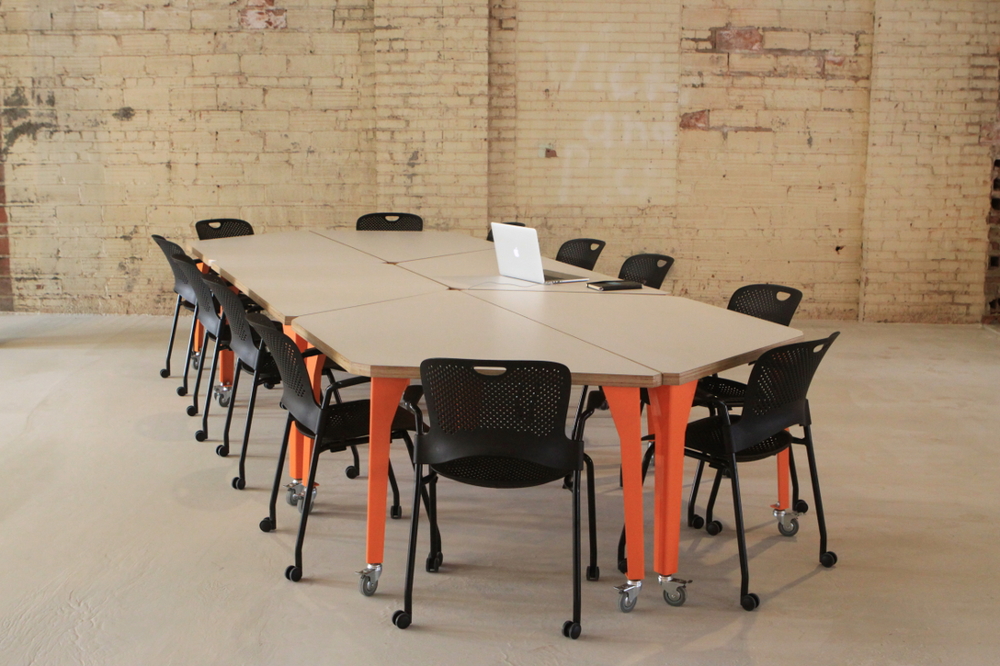
 LINCOLN—Do you remember those trapezoid tables from elementary school? The ones that were three feet tall and covered in laminate?
LINCOLN—Do you remember those trapezoid tables from elementary school? The ones that were three feet tall and covered in laminate?
Those memorable tables were the design inspiration when architect-turned-furniture-designer Jeff Scott faced a daunting task.
A large conference room in Hudl’s Lincoln office needed to be functional, but had a big pillar in the middle. And the price range for its furnishings needed to be somewhere between Ikea cheap and Herman Miller expensive.
“A normal conference table wouldn’t come close to fitting in that space,” Scott recalls. “I thought there had to be something out there that would work… But I never found one.
“So we came up with the idea of trapezoid tables that came together. Why not make a big kid version of it, put it on casters, tweak the design aesthetic and make it work?”
So that’s what Scott and his co-founder Mike Stolle created.
The six trapezoid-shaped tables came together in several different configurations and made Hudl’s third-floor conference room work.
The pair found the design was in the details: Legs that were shaped in an ode to the original style of the table, a slight opening for computer cords to sneak through when the tables came together, an overall homage to the past.
And it worked. The Trap Table became the first in a line of products from Werk LLC, a furniture design and creation startup out of Lincoln.
The name Werk (pronounced like work) emphasizes the “we”: “Our mission is to listen, work and solve problems—together,” the company’s website says.
From architects to furniture designers
Back up a bit to Omaha in 2005.
Scott and Stolle were working together at BVH Architects designing schools, churches, jails and whatever else was throw at them. But it wasn’t until they were asked to create a conference room table for the firm when they discovered their love for furniture design.
“That brought our passion for doing furniture and brought it to life,” Scott said. “Working on that level of detail, working on a piece you interact with everyday, like a table—we liked that. We enjoyed working with that scale.”
Architecture gave them a good design sensibility, Scott says, but the creativity made it happen.
The pair spent months tinkering in Scott’s garage, finding reclaimed barn wood and crafting it into furniture, all while freezing their asses off in the middle of January. By 2009, Hudl CEO David Graff, a college acquaintance introduced through family, asked the pair to help him redesign the startup’s space above Old Chicago in Lincoln’s Haymarket.
And they did.
Scott and Stolle set their sights on steel, plywood and laminate for a modern but functional feel. And an aesthetic emerged: Exposed wood edges gave warmth, steel that could be coated in any color to give identity and laminate for durability.
This year, the pair built 48 adjustable standing desks and a handful of conference room tables for Hudl’s newly opened Omaha office. But even now, they’re still learning.
Building a furniture business
Designing is one thing, but prototyping and building was the biggest hurdle the two faced.
They learned everything they could about different types of plywood and steel. They examined every piece of furniture around them, noticing details like how the legs were put together and how they were secured to the table.
The pair built 30 tables in Scott’s basement before realizing that was going to be impossible to scale that way. So they approached fabricators, many which were too big or too small to pull off what they were trying to do.
At one point, a steel fabricator in Lincoln created the leg pieces, then shipped them to two different locations in Omaha to be sandblasted and then to another to get powder-coated.
Then they were shipped back to Lincoln.
They’re still working out the process, but another challenge is that everything has to be designed so it can ship in a flat box.
“It changes the way you think and design,” Stolle said. “You almost have to think of that first. It’s a battle between function and assembly.”
For now, their product line is set. Werk created the trap table, standing desks, conference room tables, a ping pong table and an expandable “scissor” table where legs come together like a pair of scissors. Prices range from $600 up to $3,000 depending on the item.
The pair isn’t necessarily targeting the startup market because most are strapped for cash, but they do hope to gain favor in mid-sized businesses in Nebraska and across the Midwest.
But for now they’re just focusing on tables. Why?
“Everyone needs a horizontal surface… And we don’t think that’s going away,” Stolle said.
Werk has a long backstory. Here’s a brief history of how two architects became furniture makers.





